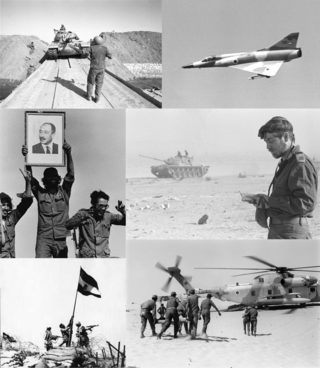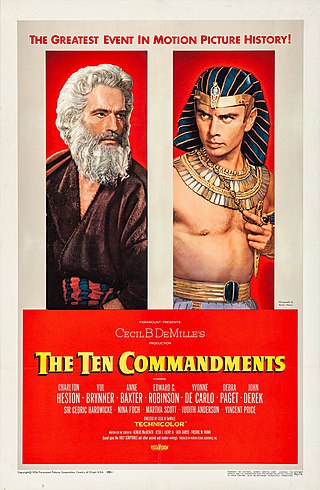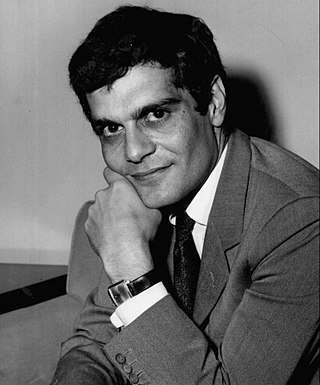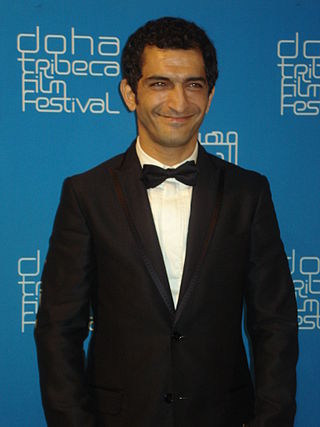
The Yom Kippur War, also known as the Ramadan War, the October War, the 1973 Arab–Israeli War, or the Fourth Arab–Israeli War, was an armed conflict fought from 6 to 25 October 1973, between Israel and a coalition of Arab states led by Egypt and Syria. The majority of combat between the two sides took place in the Sinai Peninsula and the Golan Heights—both of which had been occupied by Israel in 1967—with some fighting in African Egypt and northern Israel. Egypt's initial objective in the war was to seize a foothold on the eastern bank of the Suez Canal and subsequently leverage these gains to negotiate the return of the rest of the Israeli-occupied Sinai Peninsula.

Muhammad Anwar es-Sadat was an Egyptian politician and military officer who served as the third president of Egypt, from 15 October 1970 until his assassination by fundamentalist army officers on 6 October 1981. Sadat was a senior member of the Free Officers who overthrew King Farouk in the Egyptian Revolution of 1952, and a close confidant of President Gamal Abdel Nasser, under whom he served as Vice President twice and whom he succeeded as president in 1970. In 1978, Sadat and Menachem Begin, Prime Minister of Israel, signed a peace treaty in cooperation with United States President Jimmy Carter, for which they were recognized with the Nobel Peace Prize.

The Ten Commandments is a 1956 American epic religious drama film produced, directed, and narrated by Cecil B. DeMille, shot in VistaVision, and released by Paramount Pictures. The film is based on the 1949 novel Prince of Egypt by Dorothy Clarke Wilson, the 1859 novel Pillar of Fire by J. H. Ingraham, the 1937 novel On Eagle's Wings by A. E. Southon, and the Book of Exodus, found in the Bible. The Ten Commandments dramatizes the biblical story of the life of Moses, an adopted Egyptian prince who becomes the deliverer of his real brethren, the enslaved Hebrews, and thereafter leads the Exodus to Mount Sinai, where he receives, from God, the Ten Commandments. The film stars Charlton Heston in the lead role, Yul Brynner as Rameses, Anne Baxter as Nefretiri, Edward G. Robinson as Dathan, Yvonne De Carlo as Sephora, Debra Paget as Lilia, and John Derek as Joshua; and features Sir Cedric Hardwicke as Seti I, Nina Foch as Bithiah, Martha Scott as Yochabel, Judith Anderson as Memnet, and Vincent Price as Baka, among others.
The year 1973 in film was the overview of the events of 1973 that involved some significant events.

Omar Sharif was an Egyptian actor, generally regarded as one of his country's greatest male film stars. He began his career in his native country in the 1950s. He is best known for his appearances in American, British, French, and Italian productions. His career encompassed over 100 films spanning 50 years, and brought him many accolades including three Golden Globe Awards and a César Award for Best Actor.

Ismailia is a city in north-eastern Egypt. Situated on the west bank of the Suez Canal, it is the capital of the Ismailia Governorate. The city had an estimated population of about 430,000 in 2021. It is located approximately halfway between Port Said to the north and Suez to the south. The Canal widens at that point to include Lake Timsah, one of the Bitter Lakes linked by the Canal.

The Prince of Egypt is a 1998 American animated musical drama film produced by DreamWorks Animation and released by DreamWorks Pictures. The second feature film from DreamWorks and the first to be traditionally animated, it is an adaptation of the Book of Exodus and follows the life of Moses from being a prince of Egypt to a prophet chosen by God to carry out his ultimate destiny of leading the Hebrews out of Egypt. The film was directed by Brenda Chapman, Steve Hickner, and Simon Wells, and produced by Jeffrey Katzenberg, Penney Finkelman Cox, and Sandra Rabins, from a screenplay written by Philip LaZebnik. It features songs written by Stephen Schwartz and a score composed by Hans Zimmer. The film stars the voices of Val Kilmer, Ralph Fiennes, Michelle Pfeiffer, Sandra Bullock, Jeff Goldblum, Danny Glover, Patrick Stewart, Helen Mirren, Steve Martin, and Martin Short.

Geraldine Leigh Chaplin is a British-American actress.

Adel Emam is an Egyptian film, television, and stage actor. He is primarily a comedian, but he has starred in more serious works and, combined comedy with romance especially in his earlier secondary roles in films such as My Wife, the Director General, My Wife's Dignity, My Wife's Goblin and Virgo, all films starring Salah Zulfikar.

Hassan el-Imam was a prominent Egyptian film director. He was nicknamed the Box-office King.
Middle Eastern cinema collectively refers to the film industries of West Asia and part of North Africa. By definition, it encompasses the film industries of Egypt, Iran, Bahrain, Iraq, Israel, Jordan, Kuwait, Lebanon, Palestine, Oman, Qatar, Saudi Arabia, Syria, United Arab Emirates, and Yemen. As such, the film industries of these countries are also part of the cinema of Asia, or in the case of Egypt, Africa.
The following is a list of Egyptian films. The year order is split by decade. For an alphabetical list of films currently on Wikipedia, see Category:Egyptian films.

The cinema of Egypt refers to the flourishing film industry based in Cairo, sometimes also referred to as Hollywood of the East or Hollywood on the Nile. Since 1976, the capital has held the annual Cairo International Film Festival, which has been accredited by the FIAPF. There are an additional 12 festivals. Of the more than 4,000 short and feature-length films made in MENA region since 1908, more than three-quarters were Egyptian films. Egyptian films are typically spoken in the Egyptian Arabic dialect.

The Night of Counting the Years, also released in Egypt as The Mummy (Elmomya) (المومياء), is a 1969 Egyptian film and the only feature film directed by Shadi Abdel Salam. It features Nadia Lutfi in special appearance. It is the 3rd on the list of Top 100 Egyptian films. The film was produced by Roberto Rossellini for General Egyptian Cinema Organisation. Rossellini was instrumental in encouraging Abdel Salam to make the film, The Night of the Changing Years tells a story set among the grave robbers of Kurna in Upper Egypt.

Salah El-Din Ahmed Mourad Zulfikar was an Egyptian actor and film producer. He started his career as a police officer in the Egyptian National Police, before becoming an actor in 1956. He is regarded as one of the most influential actors in the history of the Egyptian film industry. Zulfikar had roles in more than a hundred feature films in multiple genres during a 37-year career, mostly as the leading actor. He was one of the most dominant leading men in Egyptian cinema.

Amr Waked is an Egyptian film, television and stage actor. He is best known to international audiences and in Hollywood for his role in the 2005 film Syriana. Other prominent roles include a Yemeni Sheikh called Muhammad in Salmon Fishing in the Yemen, Pierre Del Rio in Luc Besson's Lucy and Farouk Hassan in Ramy.
Empire M is a 1972 Egyptian drama film directed by Hussein Kamal. The film was entered into the 8th Moscow International Film Festival in 1973. It was also selected as the Egyptian entry for the Best Foreign Language Film at the 46th Academy Awards, but was not accepted as a nominee. The film was remade in a Turkish as Benim Altı Sevgilim in 1977.














